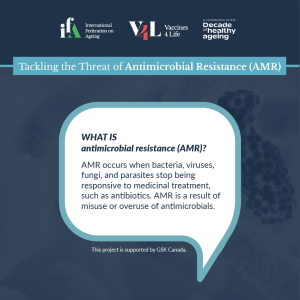Tackling the Threat of Antimicrobial Resistance (AMR)
Antimicrobial resistance (AMR) is one of the most pressing global public health challenges of our time, threatening the efficacy of modern medicine and the sustainability of effective public health responses. In Canada and worldwide, the rise of AMR poses significant risks, especially among older adults and individuals with chronic health conditions.
To address these challenges, the International Federation on Ageing hosted a webinar titled "Tackling the Threat of Antimicrobial Resistance." The webinar featured expert presentations on the risks of AMR and current strategies to combat it, with a particular focus on the role of nongovernmental organizations. It explored the impact of AMR, emphasizing the heightened risks among older adults, both those living in the community and those in long-term care (LTC) settings.
The webinar included three expert presentations, followed by a moderated question-and-answer session and panel discussion. Watch the recording below.
Guest Speakers
Enis Bariş: Professor; Director of Global Health Policy Partnerships
Enis Barış, MD, MSc, PhD, is a Professor of Health Metrics Sciences and Director of Global Health Policy Partnerships at the Institute for Health Metrics and Evaluation (IHME) at the University of Washington and Adjunct Professor at the McGill University, Montreal, Quebec, Canada. He is a global health policy and systems scholar and expert with a background in Medicine, post graduate degrees in Public Health, and epidemiology in health services management.
Prior to joining the IHME, Dr Barış held a number of senior and lead technical, advisory and managerial positions, namely (i) Senior Advisor at the Global Fund in Geneva where he spent two years with the Health Finance Department; (ii) The World Bank where he worked and retired from, after more than two decades of employment both as a technical expert and later as Manager of three different WB regions; (iii) as Director of Country Health Systems at the Regional Office for Europe (EURO) of the World Health Organization (WHO) for two years; and (iv) as Chief Scientist and Senior Scientific Advisor at the International Development Research Centre (IDRC), Ottawa, Canada for six years.
Dr. Barış has a proven track record of intellectual leadership in global health policy and systems and high-level policy dialogue. He has worked in more than sixty countries in Europe, Latin America, Asia (including China), sub-Saharan Africa, the Middle East and North Africa, as well as in international fora, and has a solid understanding of healthcare systems and the role of macroeconomics, economic growth and their distributional impact on health outcomes.
He is the author and co-author of many peer-reviewed publications and gray literature as well as several books and book chapters. Before his retirement from the World Bank in October 2020, and thereafter as Senior Advisor, he led the preparation of the World Bank’s new Health, Nutrition and Population Strategy, and served as the lead author and editor of the World Bank’s flagship publication “Reimagining Primary Health Care.; Walking the Talk” published in June 2021.
Ms. Mary Lynne Van Poelgeest-Pomfret: President of the World Federation of Incontinence and Pelvic Problems
Is a long-standing international patient advocate promoting the rights of patients at both national and international levels. A member of several patient advocacy movements and organizations like IAPO (International Alliance of Patient Organizations) and EPF (European Patients Forum). She has organized several workshops and given numerous presentations at major international scientific and patient advocacy organizations. She is also a member of the EFPIA PatientThinktank. She became Vice-Chair of EFGCP as of March 2017 and is keen to actively contribute to the work of EFGCP, primarily from the patient perspective. She participated in the first EUPATI workshop of patient advocate experts in Frankfurt in September 2012 and actively participates in EUPATI. Lynne became the President of WFIP – World Federation for Incontinent Patients in January 2011: an international umbrella organization dedicated to enhancing the rights of patients suffering from incontinence and pelvic floor dysfunction in general. In this capacity the latest initiatives include a collaborative agreement with the European Association of Urology relating to patient advocacy issues. Also until April 2016, chairperson of the ICP – Netherlands Interstitial Cystitis Patients’ Organization. More recently she became a member of the ‘Core Board’ for one of the EIP – AHA Focus groups led by the University of Valencia, Spain.
Member of the PACT Steering Committee and also a member of the IMI project PARADIGM as patient engagement representative of EFGCP. Also as EFGCP a member of the Consortium for the new IMI project ‘Conception’ These latter initiatives are very much concerned with access to healthcare and patient engagement throughout healthcare in Europe. Member of several scientific advisory committees and panels, including the EMA.
Recently selected to become a member of the IMI panel of patient experts with active participation in, for example, healthcare decision-making within the EU.
Lynne worked for Shell in the Netherlands for 23 years and has a BA degree from the UK and Drs. Degree from Leiden University in the Netherlands.
Dr. Pilar Ramon-Pardo: Antimicrobial Resistance Special Program Chief at the Pan American Health Organization
Dr. Pilar Ramon-Pardo is the Antimicrobial Resistance Program Chief at the Pan American Health Organization (PAHO), where she has spearheaded efforts against the critical challenge of antimicrobial resistance (AMR) across the Americas for over 15 years. In this role, she coordinates the planning, programming, and implementation of regional strategies to support Latin American and Caribbean countries to develop and expand their national responses to AMR.
Holding a Doctorate in Medicine from the Complutense University in Madrid, with a strong background in infectious diseases and epidemiology, she is at the forefront of promoting surveillance, advocating responsible antimicrobial use, and enhancing infection prevention measures. A fervent supporter of the One Health approach, Dr. Ramon-Pardo collaborates with various sectors to combat AMR effectively.
Beyond her work at PAHO, she has demonstrated a profound commitment to community engagement, having worked with NGOs such as Doctors of the World to address infectious diseases in vulnerable populations in Africa and Central America. Through her leadership, research efforts, and policy development, Dr. Ramon-Pardo is a pivotal figure in the global battle against antimicrobial resistance, ensuring public health safety and fostering sustainable practices worldwide.




